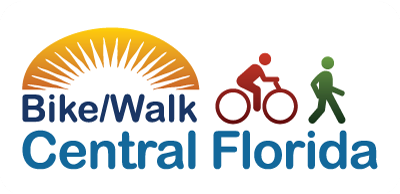On a warm, sunny day in March, people driving through the heart of downtown Kissimmee came upon an unusual sight—business owners, downtown residents, even elementary children lined the streets. They were shouting positive messages and holding signs that said things like, “Slow down to see Kissimmee… speed up to see our jails!” and “Eyes up, phones down.” One block farther, drivers noticed a line of St. Cloud police officers on motorcycles, watching diligently for drivers who failed to yield for people using the crosswalk, as Florida law requires.
This was just one scene from Operation Best Foot Forward on March 11 and 12, 2020. Over the course of two days, five law enforcement agencies conducted a crosswalk crackdown operation on 17 crosswalks across Orange and Osceola Counties. Participating agencies included the Orange County Sheriff’s Office, the Orlando Police Department, the Osceola County Sheriff’s Office, the Kissimmee Police Department and the St. Cloud Police Department. In total, they issued 189 citations and warnings to drivers for Failure to Yield to a Pedestrian in a Crosswalk.
Best Foot Forward (BFF) coalition partners chose March 11 and 12, because it’s just after the start of Daylight Saving Time. A new study shows traffic crashes spike during the first six days after we “spring forward.” The study attributes the spike to adjusting to darker morning commutes to work or school and sleep deprivation.
For pedestrians, the combination of sleep-deprived drivers and crossing the street can be a deadly one. BFF’s goal is to change that. BFF uses a three-pronged approach of community education, low-cost engineering and high-visibility enforcement to get more drivers to yield to people crossing the street in marked crosswalks.
Operation BFF is the high-visibility enforcement piece of the program. During Operation BFF, a law enforcement team sets up at a pre-selected crosswalk. A plainclothes officer or deputy crosses the street, using the crosswalk and making sure to give drivers enough time to yield and stop, as Florida law requires. If drivers don’t stop, they are pulled over by uniformed officers and given a ticket of at least $164 and three points on their license.
How do BFF partners choose which crosswalks to enforce? They take into account a number of factors including: crosswalks in close proximity to schools, LYNX bus stops and/or SunRail stations, crosswalks located in high-crash corridors and crosswalks with engineering changes planned.
Crosswalks enforced on March 11 and 12 include:
- A crosswalk in a high-crash area of Pine Hills, near Evans High School, where drivers frequently exceed the 40-mph speed limit (Pine Hills Rd. & Figwood Ln., Orange County)
- A popular trail crossing, used by bikers and walkers more frequently with extended daylight hours (Thacker Ave. & Kissimmee Trail, Kissimmee)
- A crosswalk at a high-crash intersection near the UCF campus. Students frequently use the crosswalk to get from their apartments onto campus. One student was hit by a driver just two blocks away in June (University Blvd. & Alafaya Tr., Orange County)
- A crosswalk in Downtown Kissimmee where BFF joins local business owners, who are on a quest to make the streets safer to encourage more visitors and shoppers (Broadway & W. Dakin Ave., Kissimmee)
- Three crosswalks in Celebration, chosen because of input from local residents, and in close proximity to homes, schools, churches and Disney headquarters (Osceola County)
- A newly installed crosswalk, complete with a rectangular rapid flashing beacon (RRFB) next to a city park and a LYNX bus stop (Virginia Ave. and 10th St., St. Cloud)
The goal of Operation BFF is to get more drivers to yield to pedestrians in marked crosswalks—ultimately making the streets safer. The latest stats show three pedestrians are injured every day and at least one is killed every single week in the Orlando metro area. Best Foot Forward was launched to reverse the trends of pedestrian injury and death by focusing on one specific behavior change – increase driving yielding behavior at crosswalks. BFF data collectors go out to the chosen crosswalks before and after each enforcement to track how many drivers are obeying the law and stopping for people in crosswalks. That data has shown that enforcement makes a difference. When combined with education and engineering, we’ve seen the rates of drivers yielding increase dramatically.
Best Foot Forward is more than a campaign. It is a behavior change-based program focused on changing attitudes and behaviors of drivers when encountering pedestrians who are just trying to cross the street to shop, go to work, exercise, and take part in everyday life. Whether it is spring-forward time, fall-back time, or anytime, pedestrians have the same expectations as drivers. This includes a life free of injury or worse.
See our latest media reports for Operation BFF
See more pictures of Operation BFF on our Flickr page
Read more about Operation BFF enforcement best practices we follow

